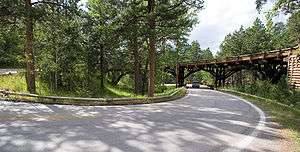Spiral bridge

A spiral bridge, loop bridge, or pigtail bridge is a road bridge which loops over its own road, allowing the road to climb rapidly. This is useful in steep terrain, or where the approach road to a bridge would terminate too far from the bridge's end. The shape of the bridge forms a helix, not a spiral.
Many multi-storey car parks feature such a design as this.
Pigtail bridge

In the Black Hills of South Dakota, a particular form of spiral bridge, locally called a 'pigtail bridge' was introduced in 1932 by Cecil Clyde Gideon, the self-taught superintendent of Custer State Park turned highway designer. He called them “spiral-jumpoffs”. During the planning for Iron Mountain Road, there was a need to negotiate sudden elevation drops while preserving natural features for this scenic highway; the corkscrew design allowed for a spectacular - although expensive - solution to this problem. In order to blend the bridges with their surroundings, natural materials such as local timber were used.
Most pigtail bridges were built by the Civilian Conservation Corps in the 1930s.
List of spiral road bridges
| Name | Location | Year | Comment |
|---|---|---|---|
| Spiral Bridge at Hastings High Bridge | 1895-1951 | ||
| South Dakota Highway 87 in Wind Cave National Park | |||
| Steinmen Crossing on Oregon Highway 273, part of Historical U.S. Highway 99 through the Siskiyou Mountains. | |||
| A bridge on US Route 441 between Gatlinburg, Tennessee and Cherokee, North Carolina at Bearpen Hollow in the Great Smoky Mountains National Park | |||
| Three bridges on Iron Mountain Road | 1930s | ||
| Lincoln Tunnel approach road to west portal. | |||
| Astoria–Megler Bridge south approach. | |
||
| General Artigas Bridge | |
From Colón, Entre Ríos, Argentina to Paysandú, Paysandú Department, Uruguay, across the Uruguay river. Cantilever bridge with a spiral on the Uruguay side. | |
| Wiadukt Stanisława Markiewicza | |
1904 | In Ulica Karowa which connects Krakowskie Przedmiescie to river level, |
| C-345 | |
||
| Thames Tunnel (planned, not constructed) | |
1825-1843 | Originally planned to have an underground spiral giving access to road traffic, but this was never built.[2] |
| Sa Calobra | |
39°49′55″N 2°48′57″E / 39.831968°N 2.81574°E | |
| N8 Bypass Brienzwiler | |
46°45′02″N 8°06′32″E / 46.750521°N 8.108833°E | |
| Isenfluh | |
||
| A6 Highway | |
44°19′13″N 8°22′38″E / 44.320409°N 8.377118°E | |
| Antirio to Lamia highway (E65) | |
on the climb of Mount Parnassos to Delphi, Greece. 270° spiral using an overpass. | |
| Rongqiao Road Spiral Bridge | |
||
| Nanpu Bridge interchange | |
2004 | |
| Ma On Shan Bypass | |
||
| New Clear Water Bay Road | |
22°19′54″N 114°13′29″E / 22.331717°N 114.224617°E | |
| Kawazu-Nanadaru Loop Bridge | |
1981 | Double loop bridge. 34°47′28″N 138°56′17″E / 34.791°N 138.938°E |
| Mizukami Loop Bridge, | |
32°18′54″N 131°00′36″E / 32.315°N 131.01°E | |
| Yurikamome approach to Rainbow Bridge | |
From the mainland. | |
| Cahill Expressway | |
Spiral turns left in order to turn right. |
Spiral bicycle bridges
The Nesciobrug over the Amsterdam-Rijnkanaal in Amsterdam
Spiral pedestrian bridges
- 1998-2004, Glass Spiral Bridge, Millennium Place, Coventry, England
Turnover bridges
Turnover bridges were a feature of some early British canals such as the Macclesfield. The boats were pulled by a horse, and in locations where the towpath crossed to the opposite bank, the spiral on one side allowed the horse to continue without detaching the tow rope. They were not universally provided as they were more expensive to build, needing to span both the canal and the towpath.
See also
References
- ↑ https://www.google.com/maps/place/Gatlinburg,+TN/@35.6353617,-83.4666614,17z/data=!4m2!3m1!1s0x885953eacb08a589:0x4ab1d7ae7eb779a8
- ↑ J.W. Parker, The roads and railroads, vehicles, and modes of travelling, of ancient and modern countries, p. 154
Further reading
- Bernie Hunhoff, The Man Who Designed the Pigtails, South Dakota Magazine, 27 July 2006,
- Jim Pisarowicz, Pigtail Bridge, Wind Cave National Park, National Park Service
- Brochure, Welcome to the Peter Norbeck Scenic Byway, United States Forest Service
- Missouri River Bridges of South Dakota, 1920 to 1980, interview of Kenneth R. Scurr, Former South Dakota Bridge Engineer, by Emory Johnson, So. Dakota State University